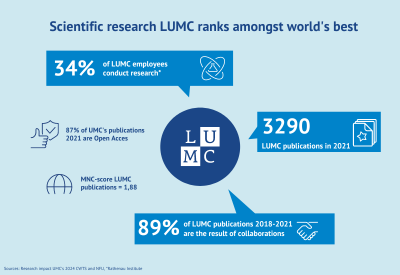Scientific research LUMC ranks amongst world's best
&w=710&h=710)
Unique situation
LUMC's strength lies in the daily connection between our four core tasks: research, education, patient care and valorization. This unique situation enables LUMC experts to perform research across the entire research chain: from research on single cells, organs on a chip, from laboratory animals to patient-related research and large international clinical trials. The results of scientific research are published in scientific journals and contribute to new developments in healthcare. And with success! Together, the Dutch university medical centers (UMCs) are responsible for 40% of all scientific publications within the Netherlands. As such, they are a major contributor to the Dutch knowledge economy.
Accelerating trough collaboration
The LUMC researches and develops innovations to improve treatments for patients with complex or rare diseases. For this, international collaboration is particularly important. Within one country there are often too few patients to draw reliable scientific conclusions. LUMC experts therefore collaborate in, for example, European Reference Networks (ERN). The results of joint research lead to new insights that in turn can lead to new treatments.
In addition, LUMC collaborates extensively with various healthcare and educational institutions and is also part of the Leiden Bioscience Park (LBSP). The LBSP is Netherlands' largest ecosystem in the field of life science & health. By working together and sharing research facilities, knowledge and expertise, the partnerships accelerate scientific research.
Numbers tell the tale
There are several ways to measure how important a scientific publication is. One example is the citation score. This score shows how often other researchers refer to LUMC research. The more references, the higher the citation score, the more influence the research has.
You can also compare the citation score to the global average. This is called the Mean Normalization Citation (MNC) Score. A MNC score of one corresponds to the world average. A score of two means that a publication was cited twice as often as the world average. Analyses show that with a score of 1.88, LUMC is well above the world average and can compete with top European and American institutions.
Open Access
The UMCs participate in the national program Open Science. The goal of the program is to share publications, data, software, and other forms of scientific information with other researchers at the earliest possible stage and make them available for reuse. An important part of Open Science is Open Access. Open Access is a publishing model that makes research information available to readers for free, as opposed to the traditional model in which readers have access to scientific research by paying a subscription fee. By publishing research results in Open Access journals, they are available to research centers around the world. Even for those with fewer financial resources. 87% of UMC publications in 2021 were published in Open Access journals. A significant increase from the previous measurement in 2018 where only 70% of UMC publications were Open Access.
Societal impact
The most important outcome of scientific research is to have an impact on society. We call this valorization. One type of valorization is, for example, applying for a patent based on scientific results. Or setting up a startup company that will further develop the technology. The LBSP houses most of the life science startups in the Netherlands, making it an important part of the Dutch knowledge economy. Other forms of valorization include formulating new guidelines in the treatment of a disease or drafting policy documents. But also sharing scientific knowledge with public society and thereby increasing awareness regarding the latest scientific developments, are a form of valorization.
Let science keep working
Scientific research is undoubtedly the driving force behind healthcare innovation. The quality of scientific research within the LUMC is of the highest level. By working together and sharing knowledge and research results with the world, LUMC researchers accelerate scientific research in the field of complex and rare diseases. It is therefore important to continue to invest in scientific research. So that now, and in the future, we can continue to help patients with state-of-the-art treatments.
Want to read more?
You can find more information about scientific research of the UMCs and the report Research Impact of the Dutch University Medical Centers 2024 on the website of the NFU.
Click on image to enlarge.
